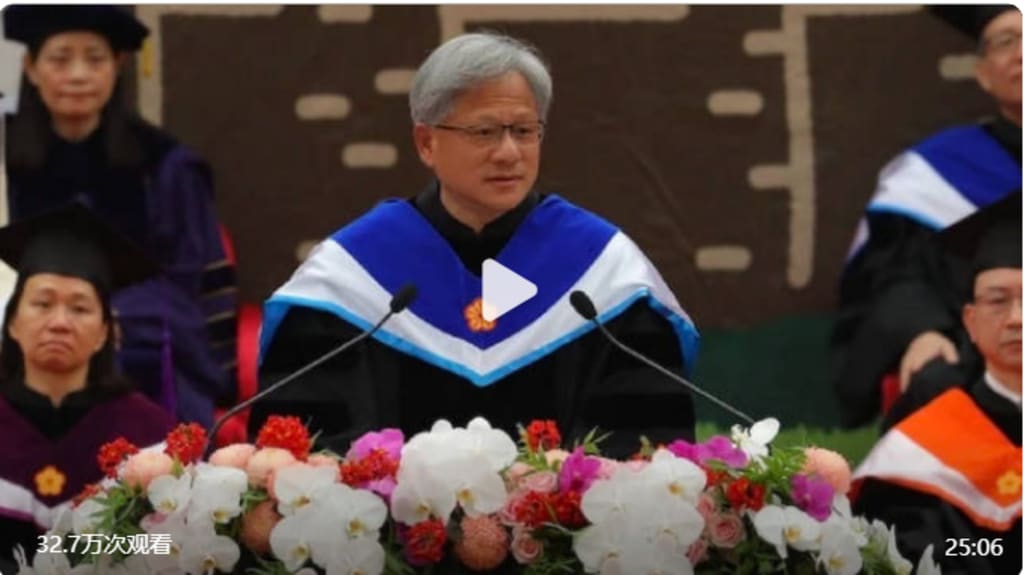Full text of Huang's (founder of Nvidia)commencement speech at Taiwan University on May 27
In his speech, Huang shared three stories of Nvidia's near-failure, and urged NVIDIA graduates to learn to face mistakes, seek help, persevere in pursuit of a vision, develop character, and learn to give up.

Full text of Huang's commencement speech at Taiwan University on May 27
1. Jen-hsun Huang, founder of Nvidia, was invited to deliver the commencement speech at Taiwan University on May 27. He began by greeting everyone in the local language, indicating that the local language was not good enough, so he delivered his speech in English.
2. In his speech, Huang shared three stories of Nvidia's near-failure, and urged NVIDIA graduates to learn to face mistakes, seek help, persevere in pursuit of a vision, develop character, and learn to give up.
3. At the end of his speech, Mr Wong urged the graduates to keep running and not walk slowly, whether they are running for food or not being treated as food by others.
Huang's speech lasted 20 minutes. The following is the text of the speech (without Chinese subtitles) :
(Local) Hi, everyone. I was going to speak local to you today, but... the more I think about it, the more nervous I get. I grew up in the United States, so my local language is not very standard, so can I speak English with you today? (Applause)
Okay, let's get started!
Hello, distinguished guests, parents, graduates of National Taiwan University of 2023!
Today is your special day and a dream come true -- it belongs to your parents and you must leave home soon.
Today is a day of honor. Parents sacrificed themselves to make you. My mom and dad are here, my brother is here, so let's show our appreciation to the parents who raised us.
Ten years ago, when I first came to Taiwan National University, Professor Chen invited me to see his physics laboratory. I remember his son learning about CUDA (Compute Unified Device Architecture) technology invented by Nvidia in Silicon Valley and suggesting that Professor Chen use it in quantum physics simulations.
When I arrived, he showed me what he had created: an entire room of Nvidia game graphics cards, plugged into the console of an open-plan computer, and a metal rack filled with Tatung fans for cooling.
He built a supercomputer, Taiwanese style, with game graphics cards. He did an early demonstration of the Nvidia JOURNEY here. He was very proud, he said: "Mr. Huang, because of you, I can finish my career."
What he said moved me to this day and perfectly illustrated the value of our company: helping the Einsteins and Davincys of our time complete their careers.
It is a great pleasure for me to return to the National Taiwan University as your guest speaker.
To the graduates:
Your time is complicated, but it is also your opportunity
When I graduated from Oregon State University, the world was simpler. The TV was a big one. No wireless TV, no MTV, no cell phones, no cell phones. It was 1994, and the IBM PC and the MAC Macintosh had started the personal computing revolution. Begin the development of future chips and algorithms.
You are living in a more complex world, facing geopolitical, social and environmental changes and challenges, surrounded by technology. We live in a perpetually connected and immersed world of data, parallel to the real world. Forty years ago, when the computer industry created the home PC and continued to work on AI, our algorithms drove cars or read X-rays. AI has opened the door to computer automation in the world's largest trillion industries: health care, financial services, transportation and manufacturing.
AI presents us with a huge opportunity. Companies that are quick to use AI technology will become more competitive, while those that fail to do so will suffer. Many entrepreneurs, including many of you here today, will start new companies in the future.
Just as every computer age in the past created new industries, AI has created new jobs that didn't exist before: data engineers, singing engineers, AI factory operators, AI security engineers, etc., jobs that never existed before.
Automation will eliminate some jobs, and AI will undoubtedly transform every job, dramatically enhancing the performance of programmers, designers, artists, marketers, and manufacturing planners. Like every generation before you, embrace technology to succeed. Every company and you must learn to take advantage of AI's strengths and do amazing things with the help of AI.
Some people worry that AI might take your job, others might let AI develop its own will.
We are at the beginning of a new field, like personal computers, the Web, mobile devices and the cloud. But AI's impact is more fundamental, and every level of computing will be rewritten. It changes the way we write software, the way we execute software.
In many ways, this is a regenerating opportunity for the computer industry, and a golden opportunity for Taiwanese companies. You are the cornerstone of this industry.
In the next decade, our industry will replace trillions of dollars worth of traditional computers with new AI computers.
My journey began 40 years before you. 1984 was a perfect graduation year, and I predict 2023 will be the same. What can I tell you? Today is your most successful day so far. You have graduated from National Taiwan University. I have been successful too.
Before I started Nvidia, I had failures, big failures, humiliating and embarrassing to say, that almost brought us to ruin.
Let me tell you three stories that define what Nvidia looks like today.
1. Be honest about your mistakes
Be humble and ask for help
Is the hardest thing for smart, successful people to learn.
We started Nvidia to create accelerated computing technology. Our first application was 3D graphics for PC games, and we invented an unconventional forward texture processing technique that was relatively inexpensive. We won a contract with SEGA to build a console. This has attracted game developers to develop games on our platform and provide us with corporate funding.
But after a year of development, we realized that the architecture we had designed was the wrong strategy and technically not up to scratch. Meanwhile, Microsoft is about to announce Windows 95 Direct3D based on reverse texture mapping and triangles. This means that if we finished SEGA's console, we would have created a product incompatible with Windows; But if we don't fulfill this contract, we'll go bankrupt. One way or another, we're going out of business.
I contacted the CEO of SEGA and explained to him that our invention was wrong, that we could not complete the contract and the console, and suggested that SEGA find another partner. I said to him, "We have to stop."
But I need SEGA to pay our fees in full, otherwise Nvidia will not be able to continue business.
I was embarrassed to ask the CEO of SEGA, but to my surprise, he agreed.
His understanding and generosity allowed us to live for three more months, and during that time we built Riva 128, which shook up the emerging 3D market just as we were running out of money, brought us attention, and saved the business.
The demand for our chips was so strong that I returned to Taiwan since I left at the age of four. I met Mr. Chang of Taiwan Semiconductor and began a relationship that would last 25 years.
We are honest about our mistakes and humble enough to ask for help to save Nvidia's survival. These are the most difficult traits for the smartest, most successful people like you to develop.
2. The painstaking process of pursuing a vision
Build our character
In 2007, we announced CUDA GPU-accelerated computing technology. Our vision was to make CUDA a programming model that could improve the performance of applications from scientific computing to physics simulation to image processing.
Creating an entirely new computational model is difficult and historically rare. CPU computing models have been standard for 60 years, ever since IBM System360. CUDA requires developers to write applications and demonstrate the benefits of Gpus; Developers need a large user base; The large CUDA user base needs someone in the market to buy new applications.
So, to solve the chicken-and-egg problem.
We used our gaming graphics card, the GPU GeForce, which already has a huge gaming market, to build a user base. But CUDA costs a lot, and Nvidia's profits have taken a huge hit over the years, and our market cap is barely around $1 billion. Our years of lackluster performance have left shareholders skeptical of CUDA and expecting us to focus on improving profitability.
But we stuck with it, we believed that accelerated computing was coming, we created a conference called GTC, and we worked tirelessly to promote CUDA technology around the world. Then applications like CT reconstruction, molecular dynamics, particle physics, fluid dynamics, and image processing began to proliferate, and our developers wrote the algorithms and sped up the chip calculations.
In 2014, Alex trained on our GPU and started the big explosion of AI. Fortunately, we realized the potential of deep learning and we risked everything to pursue it. Years later, the AI revolution began, and Nvidia became the driving engine. We invented CUDA for AI, and the journey forged our character. Suffering and suffering is part of the process of pursuing our vision.
3. Learning to give up is the key to success
To tell another story, in 2010, Google was making Android a platform for great graphics, and there were modem chip companies in the phone industry. Nvidia's excellent computing power makes Nvidia a good partner for Android. We were successful and our stock price soared, but competitors quickly piled in, and modem makers were learning how to make computing chips, while we were learning modems.
Because the mobile market is huge, we can capture market share. However, we have made the difficult decision to leave this market. Because Nvidia's mission is to create computers that solve "problems that ordinary computers solve," we should focus on that vision and make our unique contribution.
Our abandonment paid off, and we created a new market for robotics, with neural network processors and security architectures that run AI algorithms.
Back then, it was an invisible market. From the huge retreat from the mobile phone market, create a robot market that does not know the size of the market. Now, however, we have a multi-billion dollar business in autonomous driving, robotics and creating a new industry.
"Retreat" is not easy for smart and successful people like you. But strategic retreat, sacrifice, deciding what to give up is the core of success, the very core.
Run! Keep running no matter what
Those of you graduating in 2023, you are entering a world that is undergoing great change. Just like the personal computer and the chip revolution when I graduated, you are at the starting line of AI. Every industry will be revolutionized, reborn, ready for new ideas -- your ideas.
In 40 years, we created the personal computer, the Web, mobile devices, the cloud. What will you create now in the AI era?
Whatever it is, go for it as hard as we do, and run! Don't walk slowly.
Whether it's running for food, or not being run for food. You don't always know what situation you're in, but keep running anyway.
Take some of my mistakes and experiences with you on your journey. I hope you will be humble enough to fail, admit your mistakes, and ask for help. You will endure the pain and suffering necessary to achieve your dreams, and you will make the sacrifices necessary to live a life of meaning and advance your career.
My heartfelt congratulations to each and every one of you, Class of 2023.
refueling






Comments
There are no comments for this story
Be the first to respond and start the conversation.